Lloyds Bank has pledged to support its transgender staff following the Supreme Court’s ruling that trans women are not legally women.
Senior executives of the bank promised to ‘stand in solidarity’ with trans and non-binary colleagues following yesterday’s decision, which found the terms ‘woman’ and ‘sex’ in the 2010 Equality Act referred to biological sex.
It means the legal definition of ‘woman’ only applies to those who were born female, and trans women do not have the right to use single-sex women-only spaces such as toilets or changing rooms.
While trans activists reacted with fury to the decision, branding it ‘evil’ and calling it a set back for transgender rights, others took to social media to celebrate it as a victory for women and common sense.
Andrew Walton, Lloyds’s chief corporate affairs director, responded to the ruling just hours after it was announced, saying the company would ‘listen and support’ any employees who may be affected.
In a message seen by the Telegraph to Lloyds’s Rainbow network, which is the bank’s internal group for LGBTQ+ people, offering them ‘a note of support…on what I know will be an unsettling day following the UK Supreme Court decision’.
He added: ‘Please know that we cherish and celebrate you and we remain committed to inclusivity. If you’re a line manager, please be mindful of the potential impact on members of your team and be available to them. We are here to listen and support.’
This was followed up by a message from Sharon Doherty, the chief people and places officer at Lloyds. She reportedly wrote: ‘Very well said… Standing in solidarity at this very tough time.’

Lloyds Bank has pledged to support its transgender staff following the Supreme Court’s ‘unsettling’ ruling that trans women are not legally women (Stock image)
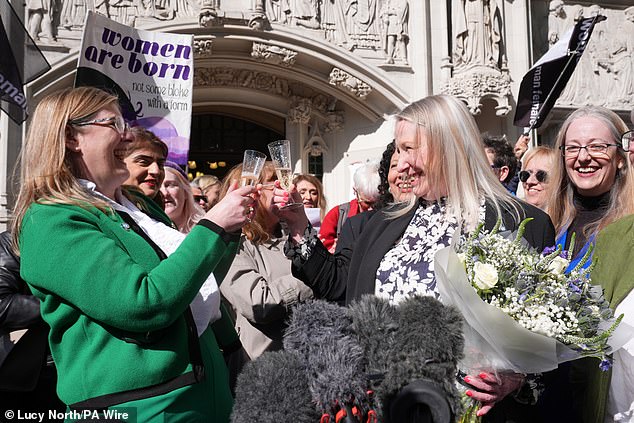
The judgment was celebrated by women’s rights groups who opened a bottle of champagne. Pictured: Susan Smith (centre left), Marion Calder (centre right) and Helen Joyce (right)
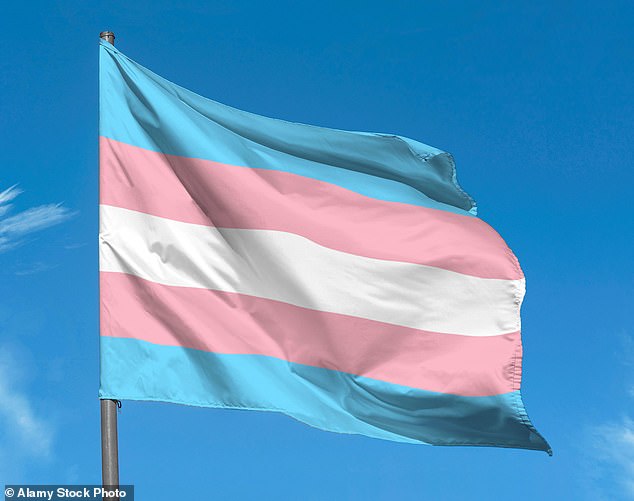
The judgment by the UK’s highest court on Wednesday found that the definition of a woman in equality law is based on biological sex
The comments were criticised by one former Lloyds employee, who claimed it was ‘risky’ for the executives to voice their opinion on a ‘political matter’.
‘It is risky. What about the women who are fighting for their rights? Employers should look after everybody,’ they told the Telegraph.
The judgment by the UK’s highest court on Wednesday found that the definition of a woman in equality law is based on biological sex.
The court ruled that the words ‘sex’, ‘man’ and ‘woman’ in the Equality Act must mean ‘biological sex’, rejecting any alternative interpretations as ‘incoherence and impracticable’.
This means that transgender women with a gender recognition certificate (GRC) can be excluded from single-sex spaces if ‘proportionate’.
In handing down the court’s judgement, Lord Hodge said he recognised ‘the strength of feeling on both sides’ and cautioned against seeing the judgment as a triumph for one side over another, stressing that the law still gives trans people protection against discrimination.
He said: ‘The unanimous decision of this court is that the terms ‘woman’ and ‘sex’ in the Equality Act 2010 refer to biological woman and biological sex.
‘In a judgement written by Lady Rose, Lady Simler and myself, with whom Lord Reed and Lord Lloyd-Jones agree, we unanimously allow the appeal.’
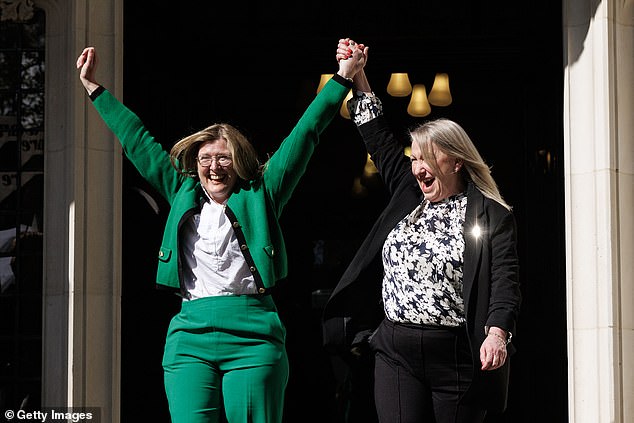
For Women Scotland directors Susan Smith (left) and Marion Calder (right) celebrate the landmark ruling
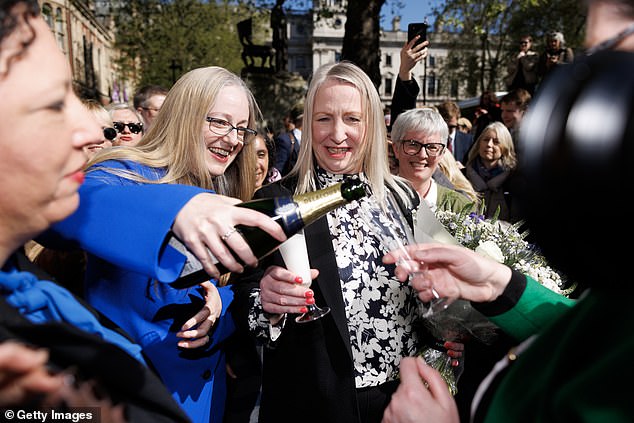
Marion Calder (centre), Helen Joyce (centre left) and Maya Forstater (left) celebrate outside the Supreme Court
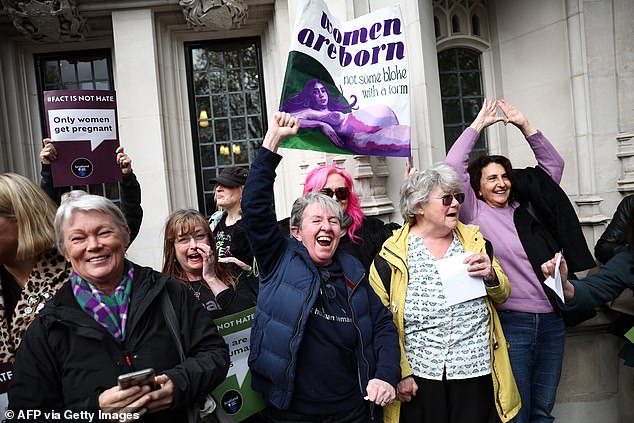
Campaign group For Women Scotland celebrating the judgement
Lord Hodge added: ‘But we counsel against reading this judgement as a triumph for one or more groups in our society at the expense of another. It is not.
‘The Equality Act gives transgender people protection not only against discrimination through the protected characteristics of gender reassignment, but also against direct discrimination, indirect discrimination, and harassment, in substance in their acquired gender.’
He recognised the ‘strength of feeling on all sides’ which lies behind the case, adding: ‘On the one hand women, who make up one half of the population, have campaigned for over 150 years to have equality with men and to combat discrimination based on their sex. That work still continues.
‘On the other hand, a vulnerable and often harassed minority, the trans community, struggle against discrimination and prejudice as they seek to live their lives with dignity.’
Their ruling also deemed that the certificated sex interpretation would have ‘rendered meaningless’ a section of the 2010 Equalities Act dealing with protection from discrimination on the grounds of sexual orientation.
This interpretation would mean ‘a trans woman (a biological male) with a GRC (so legally female) who remains sexually oriented to other females would become a same-sex attracted female, in other words, a lesbian’ and would lead to an ‘inevitable loss of autonomy and dignity for lesbians’ as well as impacting lesbian clubs and associations.
The judgment continues: ‘Read fairly, references to sex in this provision can only mean biological sex. People are not sexually oriented towards those in possession of a certificate.’
A Government spokesman said: ‘We have always supported the protection of single sex spaces based on biological sex. This ruling brings clarity and confidence, for women and service providers such as hospitals, refuges, and sports clubs. Single sex spaces are protected in law and will always be protected by this government.’







